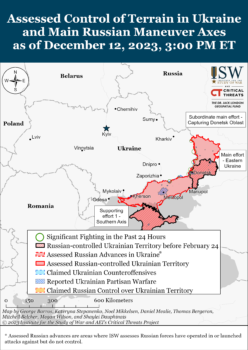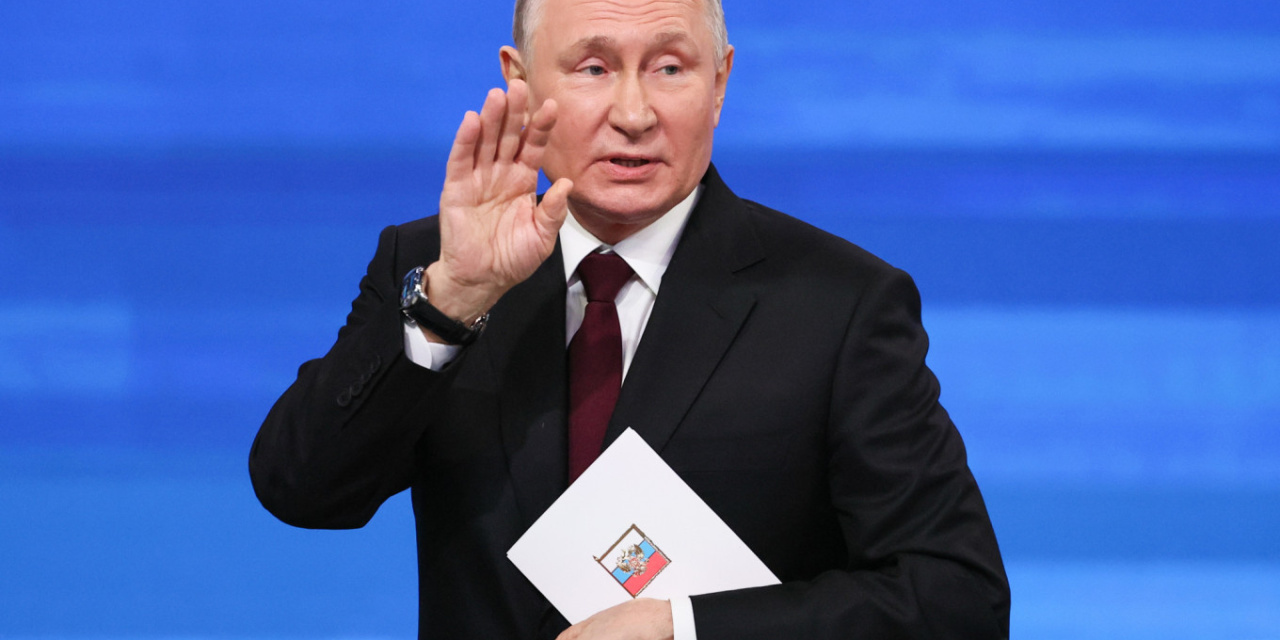Sunday’s Coverage: Putin Nominated as “Independent” Candidate for Staged Re-Election

Map: Institute for the Study of War
UPDATE 1903 GMT:
The European Council has adopted its 12th set of sanctions against Russia over Vladimir Putin’s invasion of Ukraine.
The measures include additional import and export bans and the closure of loopholes. For the first time, the direct or indirect import, purchase or transfer of diamonds, including jewellery, is prohibited.
Another 140 individuals and entities are subject to asset freezes. They include those in the Russian military and defense industry, private military companies, and the IT sector.
UPDATE 1740 GMT:
Bulgaria has abandoned a tax on the transit of Russian gas through its territory after the latest blackmail by Hungary’s Orbán Government of steps hindering Russia’s invasion of Ukraine.
Budapest threatened to veto Bulgaria’s long-standing effort to join the Schengen free-travel zone.
Facing the threat, Bulgarian lawmakers unanimously backed a proposal to abandon the exceptional tax of 20 leva ($11.17) per megawatt hour (MWh) for Russian gas from the TurkStream gas pipeline to Hungary and Serbia.
UPDATE 1733 GMT:
The next European Union summit will be on February 1, discussing a budget through 2027 which includes a €50 billion ($54.6 billion) fund for Ukraine’s resistance of the Russian invasion.
Hungarian Prime Minister Viktor Orbán, a long-time ally of Vladimir Putin, blocked the budget revision and fund — which require the unanimous support of the 27-nation bloc — last week.
UPDATE 1544 GMT:
Polish truck drivers have resumed their blockade of the main crossing at the Ukraine border, a week after it was suspended.
The stoppage was renewed just after 3 p.m. on the access roads to the Dorohusk-Yahodyn checkpoint.
The truckers have blocked three crossings since November 6, calling for access to Ukrainian markets and for the European Union to lift its waiver of permits for Ukrainian drivers.
Ukraine and Poland agreed the opening of a fourth crossing to trucks earlier this month. Some trucks are also being carried on freight trains across the border.
UPDATE 1358 GMT:
Denmark has allocated 1.8 billion crowns ($264 million) for a Swedish initiative giving CV90 armored combat vehicles to Ukraine.
Sweden has already provided 50 CV90s to Kyiv during the Russian invasion. The Danish funds will finance production of more vehicles, spare parts, and ammunition and support a multi-year maintenance agreement.
UPDATE 0722 GMT:
A voters’ committee has supported the nomination of Russian journalist Yekaterina Duntsova as a candidate in Russia’s Presidential election on March 14.
Telegram channel SOTAVision reports that 521 participants voted in favor of the nomination at a conference center in Moscow.
Duntsova is calling for an end to the Russia’s invasion of Ukraine and for democratic reforms and the release of political prisoners.
The location of the gathering was not revealed until just before it began. More than 700 people were involved, exceeding the required minimum of 500. A representative from Russia’s Central Election Commission was present.
Two police officers were also in attendance, as the moderator asked the press “not to ask political questions”. Electricity was cut off during the event.
The committee’s momination will now have to be registered with the Central Election Commission. If this is approved, Duntsova will have until January 25 to collect the 300,000 signatures from Russian residents to establish her candidacy.
Duntsova announced her plans to run for President on November 16. She was soon summoned to a prosecutor’s office and questioned about her attitude towards the invasion of Ukraine.
UPDATE 0649 GMT:
Russian authorities are now offering a signing bonus of 495,000 roubles ($5,460), as well as a fast track to citizenship for foreign nationals, for anyone willing to go to the frontline in Ukraine.
Spotted by a friend of mine on the Yekaterinburg metro:
"Military service under contract. Accelerated citizenship for foreign nationals. One-off initial payment of 495,000 roubles. Free transport from your city to selection point" pic.twitter.com/OykkZUmWRw
— Francis Scarr (@francis_scarr) December 17, 2023
ORIGINAL ENTRY: Vladimir Putin has issued a threat to NATO and its newest member Finland.
In an interview broadcast on State TV, Putin said of neighboring Finland’s accession to NATO in April, 14 months after the Russian leader’s invasion of Ukraine.
[The West] dragged Finland into Nato. Did we have any disputes with them? All disputes, including territorial ones in the mid-20th century, have long been solved.
There were no problems there, now there will be, because we will create the Leningrad military district and concentrate a certain amount of military units there.
The statement bolstered the declaration of Defense Minister Sergey Shoygu last year, “Given Nato’s desire to build up military potential near the Russian borders…retaliatory measures are required to create an appropriate grouping of troops in Northwest Russia.”
In a new interview, Putin has promised "problems" for Finland following its Nato accession pic.twitter.com/DmKsfn8IZR
— Francis Scarr (@francis_scarr) December 17, 2023
Finland is scheduled to sign a defense pact with the US military, giving the Americans access to bases and facilities. Finland’s Foreign Minister Elina Valtonen said the agreement will make “organizing peace time operations easier, but above all it can be vital in a crisis”.
Helsinki’s accession to NATO and the subsequent arrangements have ended more than 80 years of neutrality after a Soviet invasion in 1939-1940.
See also “Never Again Alone”: Finland’s Path to NATO
Finland has a 1,340-km (833-mile) border with western Russia. In recent weeks, Russia has challenged Helsinki by pushing asylum seekers across the frontier, leading Finland to close three of four crossings in November.
First Poland, Now Finland
Putin’s threat undermined his earlier claim that comments last week by US President Joe Biden — cautioning that Russia will attack a NATO country if its invasion of Ukraine is successful — are ““nonsense”.
Putin said, “Russia has no reason, no interest — no geopolitical interest, neither economic, political nor military — to fight with Nato countries”, before his boast that Russian military units are being placed close to the Finnish border.
In July, Putin issued a similar threat to Poland. He said Russia would respond “with all the means” at its disposal after Warsaw sent troops to the Belarusian-Polish border, following the redeployment of Russia’s Wagner Group mercenaries in Belarus.
Former President Dmitry Medvedev, now the deputy head of the State Security Council, declared on August 29 that Russia has “an opportunity to act within the framework of jus ad bellum against everyone in NATO countries”. In November, he said Russia considers Poland a “dangerous enemy” that could lose its “statehood”.
On Saturday, a propagandist on Russia State TV followed up Vladimir Putin’s lengthy press conference with the call for invasion of the Carpathian Mountains, which stretch across the Czech Republic, Hungary, Poland, Romania, Serbia, and Slovakia as well as Ukraine.
Appearing on Vladimir Solovyov's show, Andrey Gurulyov analyzed Putin's news conference and warned the troops to get ready to cross large bodies of water and fight in the Carpathian mountains. He said that after Russia wins in Ukraine, it will go further.https://t.co/SdOV4CE4Br
— Julia Davis (@JuliaDavisNews) December 17, 2023


[Editor’s Note: Nice summary of the Kremlin’s propaganda lines by one of its supporters.]
Putin’s threat undermined his earlier claim that comments last week by US President Joe Biden — cautioning that Russia will attack a NATO country if its invasion of Ukraine is successful — are ““nonsense”.
***********
Biden’s claim that Russia will attack a NATO country after it’s done with Ukraine is nonsense. Putin does not want direct conflict with NATO. Scott Lucas knows this. Furthermore, the establishment of the Leningrad Military District is, in nature, a defensive measure — a response to NATO’s accession of Finland and the military pact made by Helsinki and Washington. The military pact includes US use of up to 15 of Finland’s military posts and bases. Can you imagine the US tolerating a decision by Mexico to form a similar pact with Russia or China?